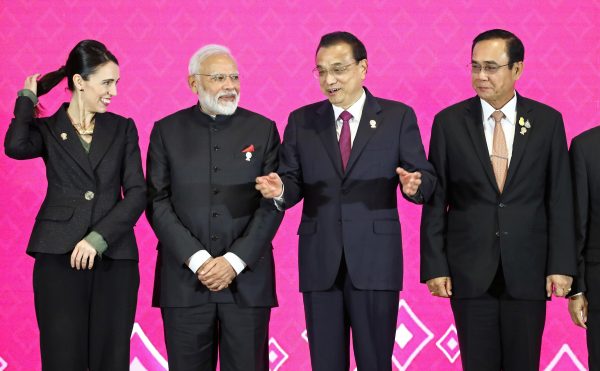China has been one of the major concerns for India since the beginning of negotiations. India’s fear lies in its US$57 billion trade deficit with China, which raises concerns that offering greater market access to China will flood India’s domestic market with cheap products. India has been pushing for an automatic trigger mechanism that would allow it to raise tariffs on products when import volumes exceed a predetermined limit to protect its domestic sectors, but RCEP members have not been receptive to this proposal
Domestic politics have also posed a significant barrier to India’s concluding RCEP. Prominent traders’ bodies like the Confederation of All India Traders (CAIT) — representing around half a million small and medium traders across the country — have never supported the proposed pact in any form. The influential Swadeshi Jagran Manch group, often recognised as the economic wing of the Rashtriya Swayamsevak Sangh (RSS) organisation, also observed an 11-day nationwide protest against RCEP during October 2019. They claimed that the deal in its current form will intensify the ongoing crisis in Indian manufacturing and agriculture.
The RSS is a sociopolitical organisation that shares close ties with the ruling Bharatiya Janata Party (BJP), which has also voiced its reservation. In his annual address, RSS Chief Mohan Bhagwat urged the Indian government to not ‘yield too much’ in trade negotiations. The RSS attempted to corner the government along economic lines at a time when the BJP performed well below expectations in the assembly elections in the states of Maharashtra and Haryana. The RSS’s dissatisfaction with the BJP has played a major role in the government’s decision to pull out from RCEP. The Indian National Congress, the main opposition party, has also raised its voice against the deal.
Some of India’s major economic sectors have also expressed reservations against the trade deal. This is not a new phenomenon and similar sector-wide protests have occured in the past. The dairy sector was particularly vocal about its displeasure with the trade pact. The Gujarat Cooperative Milk Marketing Federation Limited (popularly known as Amul) warned the government about the potentially adverse impact of RCEP. Amul asserted that opening the dairy sector to foreign competition would hit hard the many small farmers in India that are not able to compete with their peers in countries like Australia and New Zealand.
Similarly, many farmers under the banner of the Kisan Shangharsh Committee protested in Punjab, a predominantly agriculture-based state and a major producer of rice in the country. Farmers believed that the agricultural sector would be severely affected by the dumping of heavily subsidised imports. Beyond agriculture, the Society of Indian Automobile Manufacturers cautioned the government that RCEP would hamper the ‘Make in India’ scheme and lead to job losses.
India also disagreed with the other RCEP members on issues relating to the digital economy. India has been clear on its stance of not allowing free market access for digitally-traded goods. India has also never favoured proposals that mandate the free flow of data and sharing of source code. The RCEP chapter on e-commerce was therefore a major if not unresolvable point of contention among the trade pact’s membership.
India decided to withdraw from RCEP as these issues were not resolved. New Delhi has clarified that the country will not join the agreement until its concerns are addressed.
India still has the opportunity to join RCEP as members like Australia, Singapore and China have expressed their readiness for dialogue with India on these issues. India should take advantage of these opportunities to renegotiate and resolve the pending issues.
Joining RCEP will boost the Indian economy by facilitating India’s integration into advanced regional production networks. India can leverage its comparative advantage in the services sector —providing opportunities for Indian companies to access new markets. The agreement also has huge strategic importance alongside its economic benefits. RCEP offers India an opportunity to strengthen economic ties with rising powers in the Asia Pacific.
While some sectors may face challenges, the overall gain from India’s participation in the pact is likely to outweigh the losses. India should rethink its decision to walk away from RCEP.
Rahul Nath Choudhury is a Visiting Research Fellow at the Institute of South Asian Studies, the National University of Singapore.

